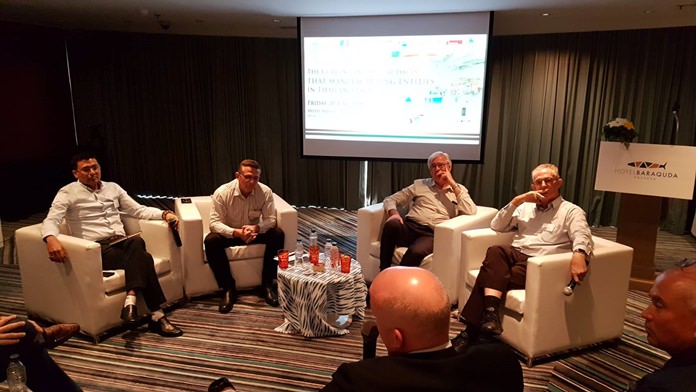
The Automotive Focus Group (AFG) and the Australian Thai Chamber of Commerce (AustCham) collaborated to host a Manufacturing Panel discussion.
 With a majority of the AFG members involved in the Eastern Seaboard manufacturing arena, and AustCham having a manufacturing group, this was an ideal time for the two groups to look at the manufacturing process and its attendant problems here in Thailand.
With a majority of the AFG members involved in the Eastern Seaboard manufacturing arena, and AustCham having a manufacturing group, this was an ideal time for the two groups to look at the manufacturing process and its attendant problems here in Thailand.
The discussion panel was made up of Dennis Horton (ARB), Praveen Jaduvanshi (Wendts), Mike Griffis (Harrington), with Frank Holzer mediating.
The discussions began with maintenance services and spares where the focus was on the inability to obtain spares for machinery, equipment, PLC’s and robotics. The results have driven some organizations to hold excess WIP and finished stock to cover lengthy breakdowns periods. Suppliers are not carrying spares, specifically on overseas long lead time parts, in the same manner that manufacturing entities are not holding expensive spares in-house.
A couple of key points were discussed: Purchasing contracts from global / international companies continue to source on lowest cost basis and are not developing contracts that require suppliers to carry the inventory to ensure a minimum lead time to facilitate repairs. In the same manner, organizations to remain internally competitive reduce stock holdings to improve cash flow.
This will become a key area for manufacturing entities – productivity and capacity utilization must improve along with the need to move further into automation. This automation focus on improved productivity is also recognized by the EEC with incentives and the realization that the Thailand Labour pool has limitations.
The next area was maintenance capabilities and skills with the discussion focus seen as maintenance management in preventative maintenance planning and execution, and the skills required from maintenance teams lacking in fundamental PLC, robotic and electrical system and software skills, where the majority of organizations have the facility and mechanical maintenance capabilities with a high reliance on outsourcing maintenance for specific equipment provided by the distribution service companies, e.g. Siemens, Kawasaki etc. This certainly could become a costly exercise with significant reliance on outside services and can add to delays depending on availability of the specific resource or skill set.
Comparison could be made by viewing this area as having the same problems of global organizations trying to reduce in-house labor and overhead levels with the view of using outsourcing as a cost advantage. However it may also detract from developing in-house knowledge and capabilities to truly seek and implement capacity improvements and cost reduction initiatives – Lack of understanding of core internal manufacturing process, systems and equipment.
One of the highlights of the evening’s discussions was internal manufacturing skills and knowledge – shop floor. This topic received input from manufacturing, chamber representatives and recruitment organizations.
There were two distinct areas – specific technical expertise and training development driven between industry, organizational and university and we are able to see organizations and industry driven results in these areas.
However, the second area was more related to the skills development at the key labor force areas, such as painting, welding, plc operations, material handling systems and process, etc.
What the discussion identified was a lack of ability to find educational training institutions that would provide specific training resulting in a qualification that would be recognized as giving the employee freedom to move from organization to organization.
The imponderable question remained: How do we develop as a manufacturing industry the combined resources that would be available to a wide range of manufacturing skills and functional knowledge development?
With 62 participants, this was an excellent forum for those in the manufacturing industries and with 60 percent of Thailand’s exports coming from the Eastern Seaboard, is a key area for local industry.





